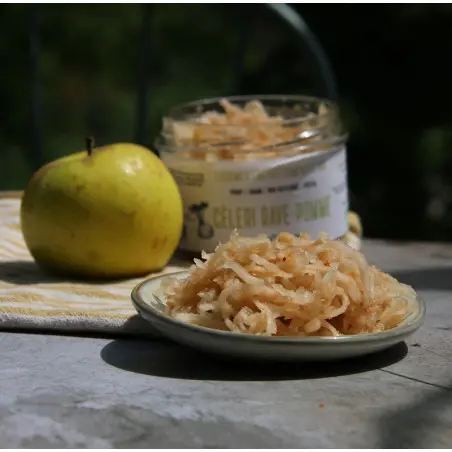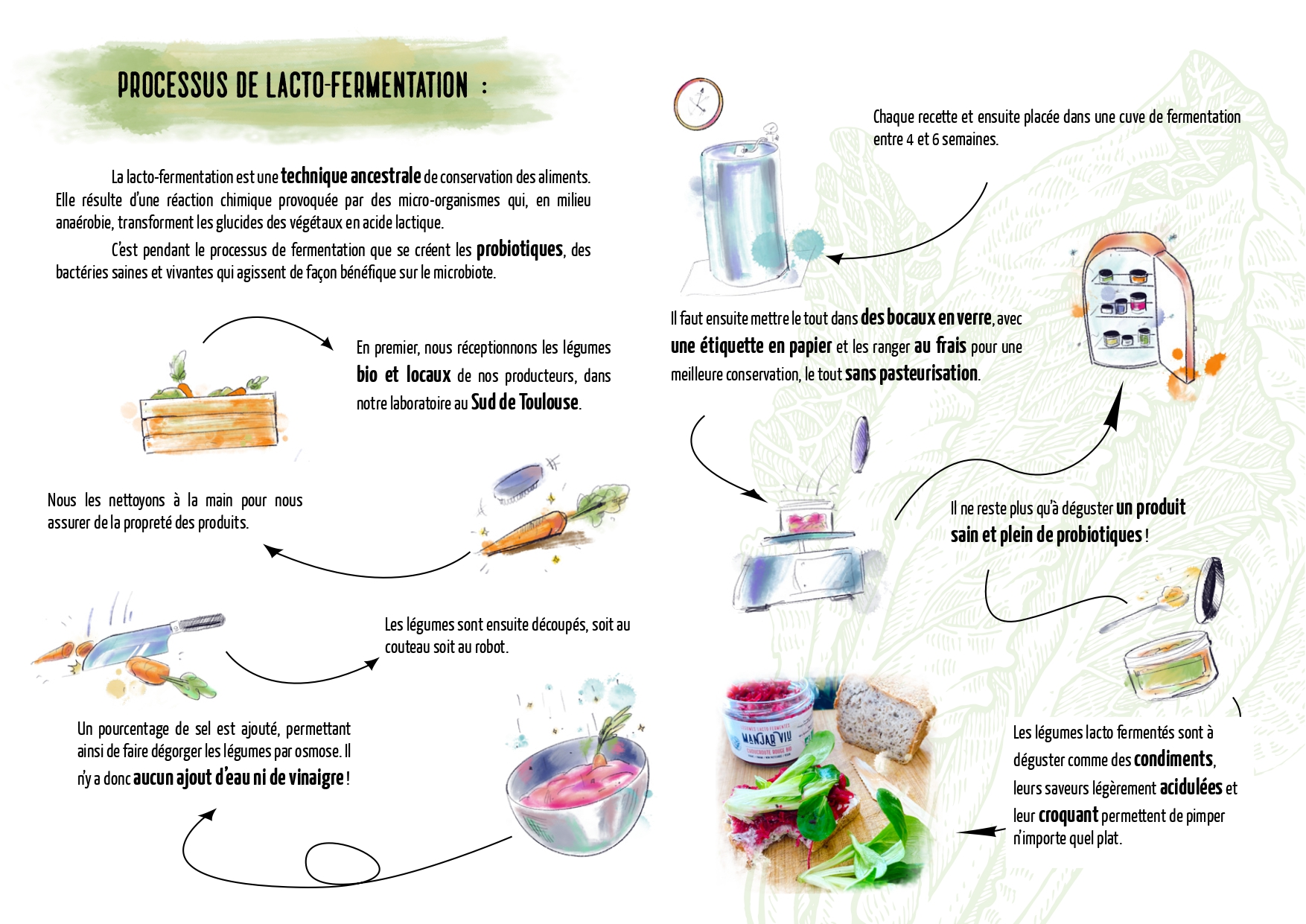- On sale!
- -€1.00


















Lacto-fermented organic celery root and apple
Certified organic
Unpasteurized
Handcrafted in France
220 g or 400 g glass jar
We are thrilled to introduce MANJAR VIU's organic, non-pasteurized lacto-fermented products ("Eating Alive" in Occitan)!
🦠 Made from organic and locally-sourced celery root and apple, this tasty blend of lacto-fermented vegetables is artisanal, carefully prepared, and unpasteurized. It offers a unique way to combine vitality and convenience in your meals.
> Free from preservatives, artificial flavors, or vinegar (which is antiseptic), you'll add a boost of pre- and probiotics to your dishes with just one or two tablespoons of this preparation! (If it makes a "pssst" sound upon opening, that's normal—it's a living product!)
> Enjoy as a condiment! The unique slightly tangy flavors and crunch of lacto-fermented vegetables can enhance any meal. Behind this jar of lacto-fermented vegetables lies a gustatory adventure and an explosion of authentic flavors with every bite: the sweet, fruity taste of apple complements the richness of umami in this recipe, delivering a uniquely satisfying sensation!
🦠 How to enjoy this jar of lacto-fermented vegetables?
Lacto-fermented vegetables can be used as a side for salads, in wraps, makis, or on crackers. These condiments will instantly elevate your dishes, salads, appetizers, toasts, sandwiches, and soups!
> It was invented about 10,000 years before refrigerators and industrial processes. Many countries around the world have developed lacto-fermented vegetable recipes: sauerkraut in Europe, kimchi and miso in Asia, cereals, and legumes in Indonesia, etc.
> It occurs through a chemical reaction caused by specific yeasts, bacteria, or fungi that, in an anaerobic environment (without oxygen), transform plant sugars into lactic acid. The environment becomes progressively acidic, preventing the growth of other organisms.
> This method has no link to lactose. Its name comes from the involved bacteria, called lactic bacteria or lactobacilli, which are not milk-derived. Lactic acid is a natural preservative that inhibits the growth of pathogenic bacteria and germs that could spoil vegetables. The vegetables retain all their vitality, or even more!
> Fermentation is an effective preservation method and a culinary art offering a wide range of surprising textures and flavors. It is also an ancestral food preservation process requiring various stages and regular monitoring to achieve the best quality final product.
> Fermented foods are known to boost the immune system, support gut flora, and aid digestion. They improve digestion, provide probiotics, and enhance nutrient bioavailability.

🦠 To learn more, check out our blog articles:
Lacto-fermentation: A True Health Asset!
What Are the Benefits of Fermented Foods?
Located in Lahage, near Toulouse, within the Bordanova third place, Mathieu, the mastermind behind Manjar Viu, specializes passionately and diligently in vegetable lacto-fermentation. Collaborating with local organic farmers, his company ensures fast and direct delivery of vegetables without intermediary storage. Production follows the rhythm of the seasons, accepting all shapes and sizes of vegetables to minimize food waste and transportation emissions.
Manjar Viu's products are natural, free from preservatives or vinegar, allowing fermentation to continue during storage.
🦠 We had the pleasure of meeting Mathieu in October 2024; watch our interview with him in this video:
🦠 Moreover, Mathieu, with a culinary background, became passionate about food preservation, finding lacto-fermentation ideal for its ecological benefits and longevity. Through Manjar Viu, he aspires to offer nutritious and delicious recipes while highlighting local cultures. He also published a recipe book in September 2022, titled “Do Yourself Good, Eat Alive,” to promote the daily use of lacto-fermented vegetables, including this excerpt:
"Today, in a constantly changing world filled with uncertainty, a sterilized, polluted world increasingly deprived of nutrients, my aim with this project is to offer flavorful and healthy recipes to boost vitality."
Ingredients: Celery* (66%), apple* (32%), and salt
*ingredients sourced from organic farming.

Packaging: Available in glass jars of 220g or 400g
Best Before Date (BBD): Consume within one month after opening.
Storage instructions: Keep refrigerated between 4 and 8 degrees Celsius.
| Average Nutritional Values | Per 100 g |
Energy | 42.4 Kcal |
| Carbohydrates (of which sugars): | 8.1 g 3.5 g |
| Fiber | 4.5 g |
| Protein | 0.9 g |
| Salt | 2 g |
Ces produits pourraient vous intéresser